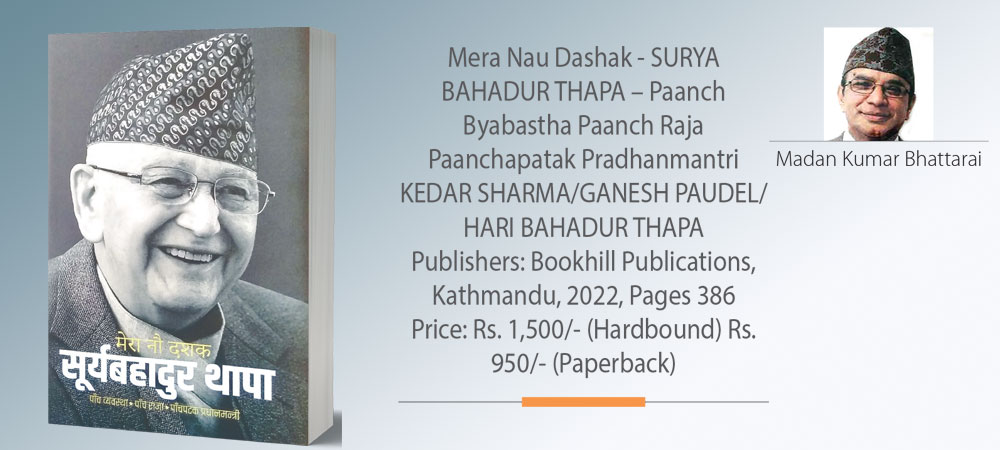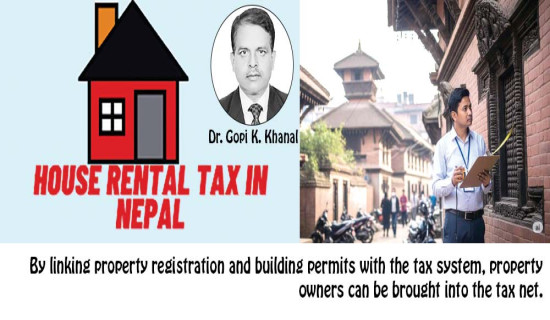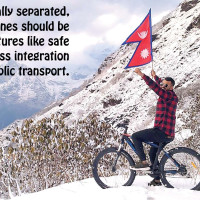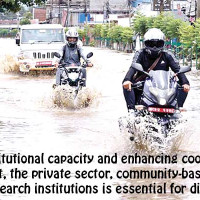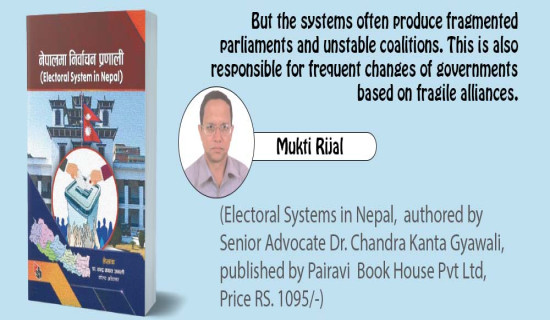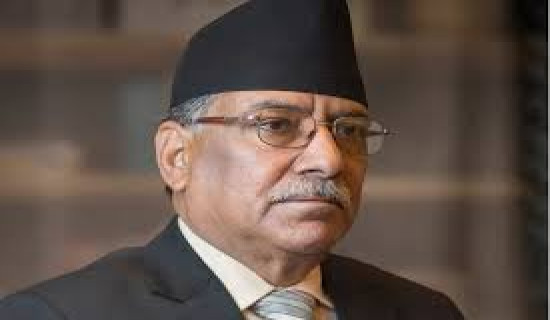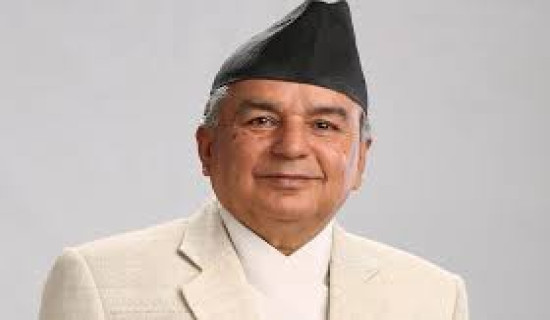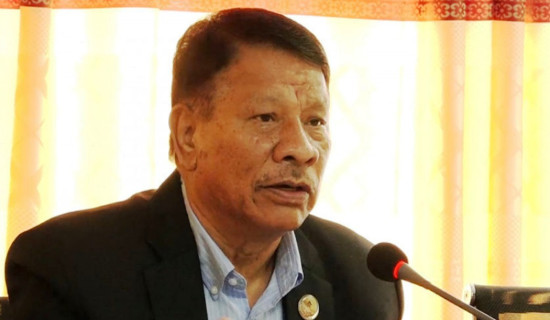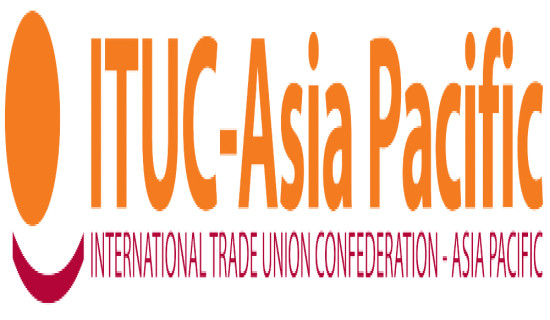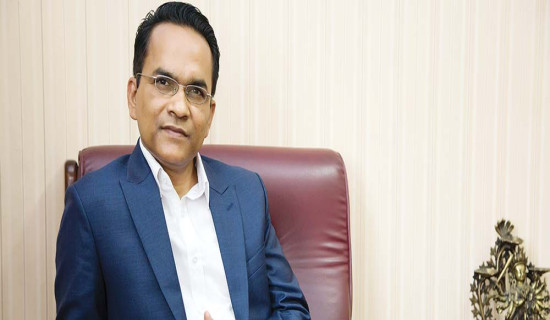- Friday, 19 September 2025
A Politician's Admixture Of History And Autobiography
Madan Kumar Bhattarai
I am pleased to read the book entitled 'Mera Nau Dashak - Surya Bahadur Thapa - Paanch Byabastha Paanch Raaja Paanchpatak Pradhanmantri' that can roughly be translated into 'My Nine Decades - Surya Bahadur Thapa – Five Systems, Five Kings and Five-time Prime Minister.'
The very title promises a wider canvas to reveal so many things hitherto unknown in Nepal primarily relating to political developments as Thapa is taken as one of the most astute political players in post-1960 era.
It is said in respect of diplomats that memoirs should not be anything than posthumous as they might portray things not easily palpable to people if unravelled in their life-time.
I don't know what will be the impact of autobiography of a practising politician that too with such a long inning. But I can easily fathom constraints Thapa must have experienced in relating his life that calibrated so much convergences and divergences, including dilemma of what to say and what not to divulge publicly.
It is an irony of fate that the book ultimately proved to be a posthumous work nearly 14 years after its conception with recordings of Thapa's statements for 6 years when he was alive, active and agile.
Kunwar Natwar Singh, Indian diplomat, prolific writer and Thapa's admirer now running 92, has a cautionary approach in writing autobiography. Singh says, understatement, restraint, objectivity – have a paralysing effect on autobiography. We don't know how far Thapa could overcome these limiting factors. The other problem for this reviewer is a trying task to judge a person one knew so well as English interpreter and civil servant.
Coming to the pith and marrow of the book launched with great fanfare in the presence of virtually all who's who including top political brass, it is a welcome addition in the list of political memoirs.
Divided into 8 chapters plus bibliography, appendices and picture gallery, the book starts with dissolution of first elected government and genesis of Panchayat regime as Thapa was one of the pivotal figures in the political landscape of the time.
Second and third chapters respectively deal with his place of birth and family, and his assessment of Rana period from close quarters. The fourth chapter depicts unstable political scenario in the fifties leading to assumption of power by elected government led by B.P. Koirala. Fifth, sixth and seventh chapters deal with genesis, growth and dissolution of Panchayat system.
The concluding chapter covers the period from restoration of multiparty order to formation of Constituent Assembly.
The book evaluates threadbare roles of leading figures like Kings Tribhuvan, Mahendra, Birendra and Gyanendra, Koiralas, Bishweshwar Prasad, Matrika Prasad and Girija Prasad, Suvarna Shumshere, Surya Prasad Upadhyaya, Ganesh Man Singh, Dr. K.I. Singh, Tanka Prasad Acharya, Dr. Tulsi Giri, Bishwa Bandhu Thapa, Rishikesh Shaha, Kirtinidhi Bista and Kaisher Shumshere.
Other selected stalwarts covered are Jawaharlal Nehru, Lal Bahadur Shastri and Indira Gandhi. The author has interestingly characterized Panchayat as a tripod involving three competing elements, conservatives (Dr. Tulsi Giri), liberals (Bishwa Bandhu Thapa) and reformists (himself).
Though seemingly critical of some aspects of approach and style, the reader is compelled to read between the lines that the ultimate takeaway of the book is Thapa's best assessment of King Mahendra among political players in practically all perspectives.
In terms of civil servants, Thapa picks Bishwa Shankar Shukla, Krishna Bam Malla, Himalaya Shumshere, Kul Sekhar Sharma and Surendra Raj Sharma among efficient bureaucrats.
Understandably, more than half of the book depicts successes and failures of partyless Panchayat system from its reveille in 1961 to ultimate retreat in 1990. As a digression, considerable space has been allotted on history from social and political perspectives that could have been avoided. This makes the book a bit anomalous, partly historical and partly autobiographical.
There are certain lacunae in the book including proof errors, mistakes in identification of names in the photo gallery and use of Chinese names. It seeks to prominently portray background behind drafting of King Mahendra's proclamation of December 15, 1960 as if this is the main motive of the otherwise very impressive book.
As Thapa has himself acknowledged, he was only fourth in hierarchy in terms of leadership ladder that cropped up in the post-1960 era and three of his seniors namely Dr. Tulsi Giri, Bishwa Bandhu Thapa and Rishikesh Shaha, and even Aniruddha Prasad Singh though lower in the order, had better drafting skills.
The other weakness of work is problem of editing as is indicated by mistakes both in content and context. We can cite some examples. Rafi Ahmed Kidwai is simply called Kiddi and Swaran Singh is Subarna Singh. Likewise, there are mistakes like Gagan Shumshere, General Mekhraj and Hem Bahadur Pande instead of Daman Shumshere, General Ekraj (Shumshere) and Bhim Bahadur Pande respectively.
Similarly, Major General Tara Bahadur Thapa was Ambassador to Thailand and not Canada, and Shankar Prasad Upadhyaya, father of Surya Prasad Upadhyaya and Sharada Prasad Upadhyaya was a Khardar, and not Sardar.
The other factual error is the context of Sir Girja Shankar Bajpai. There were, of course, demands for his dismissal and stringent punishment but Nehru never demanded his execution as we find such reference in the book.
Even in the context of Nehru's reaction to December 15, 1960 royal takeover that he was quite aware of several months before despite not sure of actual shape and form of the intended action, reference to Indian Prime Minister's silence on U Nu's removal is cited in similarity and contrast but that came about only on March 2, 1962.
Despite such minor hiccups, the book is an important addition in the field of political literature and I congratulate Sunil Bahadur Thapa for such a laudable initiative in bringing out such an important treatise focusing on his august father.
(Dr. Bhattarai associated with The Rising Nepal in mid-seventies is a former Foreign Secretary, ambassador and author involved in the study of Nepal’s foreign relations from a historical perspective. He is available on kutniti@gmail.com.)

